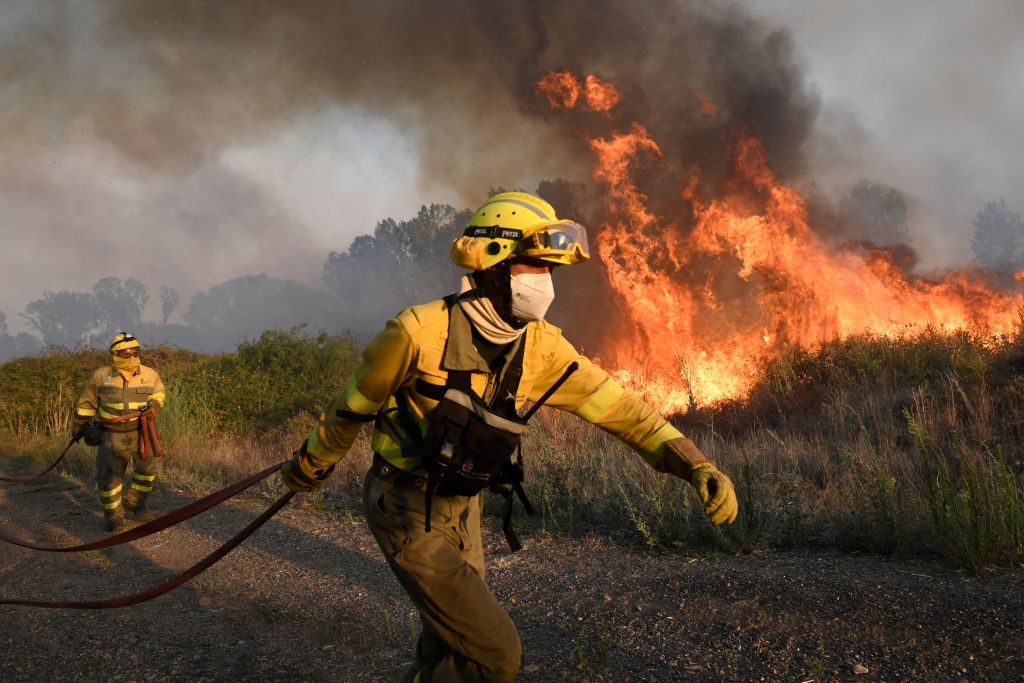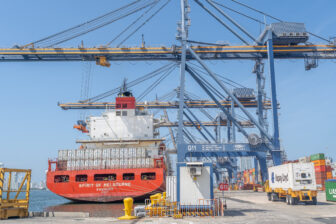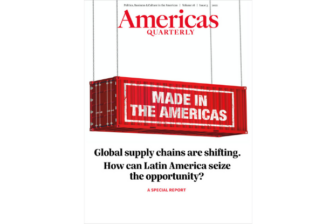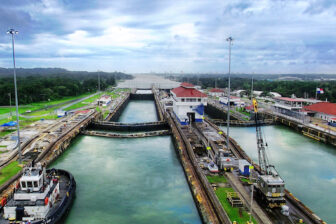MADRID — I spent the last several weeks in Europe, and regret to report: The mood here is even worse than in the Americas.
We landed in Madrid on the hottest day in its history, 105 degrees Fahrenheit (40.7 Celsius), and our train to Galicia was canceled due to wildfires amid the country’s worst drought in 1,200 years (You may have seen this viral video of flames menacing the train just before ours). In England, inflation was above 10%, on its way to as high as 18% by January, as the central bank warned of a deep recession that could last five consecutive quarters. Everywhere we traveled, the talk on TV was about either fires, strikes, rising prices or the impending need to reduce energy consumption as Russia cuts off gas in retaliation for Europe’s support of Ukraine. Spanish Prime Minister Pedro Sánchez’s answer, to forbid many businesses from setting thermostats below 80 F during summer, prompted warnings that Spaniards and foreign tourists alike would “roast.” Which I can confirm: Even Texans are not that tough.
It’s important to remember that in much of Latin America, especially Brazil and the Southern Cone, policymakers and other elites watch Europe just as closely as the United States, if not more so. And they are taking away several lessons from this (northern) summer of suffering.
Among them: This is what you get for taking sides in this emerging era of multipolar conflict. Most Latin American countries condemned the Russian invasion in a United Nations vote in March, but have been more cautious since then, with most refusing to participate in Western sanctions. As Europe prepares for an energy crisis so devastating that Google searches in Germany for “Brennholz” (firewood) are exploding as winter approaches, some Latin American diplomats feel vindicated for resisting pressure from Brussels and Washington to do more. “We were outraged by what Putin did, but we were right to protect our national interests,” one told me. Brazil’s President Jair Bolsonaro has repeatedly credited his cordial relationship with Putin for guaranteeing Russian fertilizer supplies that have been scarce elsewhere, contributing to food insecurity. In a rare point of agreement between Brazil and Argentina, the Mercosur trade bloc denied a request last month by Ukrainian President Volodymyr Zelenskyy to address its upcoming summit.
Europe’s troubles also reinforce a bigger narrative: That the West is in decline and the East is ascendant, and therefore Latin America should try to strike a neutral stance between the two, and peaceably sell its commodities to everybody. This strategy, sometimes called “active non-alignment,” is increasingly en vogue among politicians and strategists on Latin America’s ideological left, center and right, as I wrote earlier this year for Foreign Affairs. It marks a major departure from the past 30 years when, with obvious exceptions, most countries in the region were broadly aligned with the West on trade, drug policy, democratic governance and other geopolitical issues.
Indeed, the small cadre of European officials who follow Latin America clearly sense something is slipping away. An internal report by the European Union’s foreign policy arm, published this month by El País, warned that Europe is losing commerce and influence in the region to Russia and China, a refrain that is all too familiar in Washington. A new generation of leaders including Chile’s Gabriel Boric and Colombia’s Gustavo Petro is “less focused on the Atlantic and more open to alternative alliances,” an EU source told the newspaper, noting that 21 of the region’s 33 countries have joined China’s Belt and Road Initiative. Predictably, the leaked report urged greater European engagement with the region. But the marquee vehicle, the EU-Mercosur trade deal that was finally completed in 2019 following two decades of negotiation, is now stuck in the approval phase amid objections on both sides of the Atlantic. With Luiz Inácio Lula da Silva, the frontrunner in Brazil’s October elections, saying he will seek to renegotiate the deal, it’s fair to wonder if the agreement will ever be implemented in any form.
So what is the alternative? Many of today’s politicians are enthused by the idea of greater integration within Latin America itself. There is so much potential here, as noted in our recent special report of AQ: Intraregional trade only accounts for 15% of trade in Latin America, compared to 38% in North America and 55% in the EU. Colombia’s new foreign minister touted regional integration in his first tweet on the job; Boric said this month he was open to discussing a single Latin American currency, an idea that remains a distant pipe dream (the Europeans might offer a few cautionary tales), but illustrates the current level of enthusiasm.
Not to be a killjoy, but the questions I keep asking are: Do enough leaders among this current group in Latin America really believe in trade? Are they willing to engage in the difficult negotiations, sacrifice and short-term destruction of jobs that even the best trade deals entail? Or will today’s presidents be content to build a few bridges and other pharaonic infrastructure projects, maybe create a new regional diplomatic body or two, and declare victory? Would that be enough to help a region that is facing its own severe post-pandemic growth and employment challenges?
Given these uncertainties, there is another way that Latin American countries could look at Europe’s troubles: What a perfect chance to draw these countries closer, and offer the food and energy that they need at this time of historic disruption and shifting alliances. Some of this is happening already, of course; there is renewed enthusiasm around Argentina’s Vaca Muerta field, which has the world’s second-largest shale gas deposits. But then you see comments like the one this month from Brazil’s Finance Minister Paulo Guedes, who in response to French criticism of Amazon deforestation, told a conference: “You all (France) are becoming irrelevant to us. You’d better treat us well, because if not we’re going to say ‘fu–k you’ and go somewhere else. Because you guys are becoming irrelevant.” Not everyone is so impolite, of course; but I worry that Guedes isn’t the only one seeing weakness, when he should be seeing opportunity.









